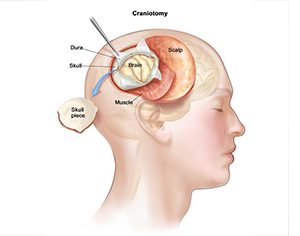
A craniotomy is the surgical removal of a part of the bone from the skull to expose the brain. This section of the bone is called the bone flap. The bone flap is temporarily removed and then replaced after the brain surgery has been done. Some procedures may use the guidance of computers and imaging to reach the precise location within the brain that is to be treated.
This technique requires the use of a frame placed onto the skull or a frameless structure that uses superficially placed markers on the scalp. Scans made of the brain with the help of these imaging techniques provide a three-dimensional image of a tumor within the brain. It is useful in making the distinction between tumor tissue and healthy tissue and reaching the precise location of the abnormal tissue.
What Makes You Eligible For Craniotomy?
A craniotomy may be done for multiple reasons such as:
Types of Craniotomy
Extended Bi-frontal Craniotomy: The extended bi-frontal craniotomy is a traditional skull base procedure generally used to target difficult tumors towards the front of the brain. Here, the surgeons generally recommend it as safer to remove extra bone than to unnecessarily manipulate the brain. The extended bi-frontal craniotomy involves making an incision in the scalp behind the hairline and removing the bone that forms the contour of the orbits and the forehead. This bone is replaced at the end of surgery. Removing this bone allows surgeons to operate in the space between and behind the eyes without having to unnecessarily manipulate the brain. The extended bi-frontal craniotomy is typically used for those tumors that cannot be removed by minimally invasive approaches.
Types of tumors that can be treated with the extended bi-frontal craniotomy usually include - Meningiomas, Esthesioneuroblastomas, and Malignant skull base tumors.
Minimally Invasive Supra-Orbital “Eyebrow” Craniotomy:
Supra-orbital craniotomy also often referred to as "eyebrow" craniotomy is a procedure used to remove brain tumors. In this procedure, neurosurgeons make a small incision within the eyebrow to access tumors in the front of the brain or as referred to as ‘pituitary tumors’. This approach is used when a tumor is very large or close to the optic nerves or vital arteries. Since it is a minimally invasive procedure, supra-orbital “eyebrow” craniotomy often provides less pain than open craniotomy accompanied with faster recovery and minimal scarring.
Retro-Sigmoid “Keyhole” Craniotomy
Retro-sigmoid craniotomy also often referred to as "keyhole" craniotomy is a minimally-invasive surgical procedure performed to remove brain tumors. This procedure allows for the removal of skull base tumors through a small incision behind the ear, providing access to the cerebellum and brainstem. Benefits of "keyhole" craniotomy include less pain after the procedure as compared to postoperative in open craniotomy, less scarring and a more rapid recovery.
Orbitozygomatic Craniotomy
The Orbitozygomatic craniotomy is a traditional skull base procedure used to target difficult tumors and aneurysms. This procedure is typically used for those lesions that cannot be removed by more minimally invasive procedures. Orbitozygomatic craniotomy involves making an incision in the scalp behind the hairline and removing the bone that forms the contour of the orbit and cheek. This enables surgeons to reach deeper and difficult parts of the brain while minimizing severe damage to the brain. Brain tumors that may be treated with Orbitozygomatic craniotomy include Craniopharyngioma, Pituitary tumors, and Meningiomas.
Translabyrinthine Craniotomy
A Translabyrinthine craniotomy is a procedure that involves making an incision in the scalp behind the ear, then removing the mastoid bone and some of the inner ear bone that contains receptors for balance. The surgeon then finds and removes the tumor or as much of the tumor as possible without the risk of severe damage to the brain.
What is Craniotomy?
A craniotomy is an opening of the skull enclosing the brain and its surrounding structures. Generally, in this procedure, the bone is preserved and later fixed into place at the end of the surgical procedure.
Why is it done?
This procedure is done if swelling occurs after the brain surgery or if the skull bone flap cannot be replaced for other reasons.
How long is the recovery?
It can take 4 to 8 weeks to recover from surgery. The cuts or incisions may be sore for about 5 days after surgery. There might be persistent numbness and pains near the wound, or swelling and bruising around the eyes.
Types of Craniotomy
Extended Bi-frontal Craniotomy: The extended bi-frontal craniotomy is a traditional skull base procedure generally used to target difficult tumors towards the front of the brain. Here, the surgeons generally recommend it as safer to remove extra bone than to unnecessarily manipulate the brain. The extended bi-frontal craniotomy involves making an incision in the scalp behind the hairline and removing the bone that forms the contour of the orbits and the forehead. This bone is replaced at the end of surgery. Removing this bone allows surgeons to operate in the space between and behind the eyes without having to unnecessarily manipulate the brain. The extended bi-frontal craniotomy is typically used for those tumors that cannot be removed by minimally invasive approaches.
Types of tumors that can be treated with the extended bi-frontal craniotomy usually include - Meningiomas, Esthesioneuroblastomas, and Malignant skull base tumors.
Minimally Invasive Supra-Orbital “Eyebrow” Craniotomy:
Supra-orbital craniotomy also often referred to as "eyebrow" craniotomy is a procedure used to remove brain tumors. In this procedure, neurosurgeons make a small incision within the eyebrow to access tumors in the front of the brain or as referred to as ‘pituitary tumors’. This approach is used when a tumor is very large or close to the optic nerves or vital arteries. Since it is a minimally invasive procedure, supra-orbital “eyebrow” craniotomy often provides less pain than open craniotomy accompanied with faster recovery and minimal scarring.
Retro-Sigmoid “Keyhole” Craniotomy
Retro-sigmoid craniotomy also often referred to as "keyhole" craniotomy is a minimally-invasive surgical procedure performed to remove brain tumors. This procedure allows for the removal of skull base tumors through a small incision behind the ear, providing access to the cerebellum and brainstem. Benefits of "keyhole" craniotomy include less pain after the procedure as compared to postoperative in open craniotomy, less scarring and a more rapid recovery.
Orbitozygomatic Craniotomy
The Orbitozygomatic craniotomy is a traditional skull base procedure used to target difficult tumors and aneurysms. This procedure is typically used for those lesions that cannot be removed by more minimally invasive procedures. Orbitozygomatic craniotomy involves making an incision in the scalp behind the hairline and removing the bone that forms the contour of the orbit and cheek. This enables surgeons to reach deeper and difficult parts of the brain while minimizing severe damage to the brain. Brain tumors that may be treated with Orbitozygomatic craniotomy include Craniopharyngioma, Pituitary tumors, and Meningiomas.
Translabyrinthine Craniotomy
A Translabyrinthine craniotomy is a procedure that involves making an incision in the scalp behind the ear, then removing the mastoid bone and some of the inner ear bone that contains receptors for balance. The surgeon then finds and removes the tumor or as much of the tumor as possible without the risk of severe damage to the brain.
What is Craniotomy?
A craniotomy is an opening of the skull enclosing the brain and its surrounding structures. Generally, in this procedure, the bone is preserved and later fixed into place at the end of the surgical procedure.
Why is it done?
This procedure is done if swelling occurs after the brain surgery or if the skull bone flap cannot be replaced for other reasons.
How long is the recovery?
It can take 4 to 8 weeks to recover from surgery. The cuts or incisions may be sore for about 5 days after surgery. There might be persistent numbness and pains near the wound, or swelling and bruising around the eyes.

Rating :
Dr. Franklin’s Panchakarma Institute is established in 1997. A pioneer in the arena of global spread of Ayurveda, physician Dr.V.Franklin visualized this institution to its existence. Within a short time of its founding, the clinic earned the title of ‘.....

Rating :



Continental Hospitals is a part of the Parkway Pantai Ltd. Parkway Pantai is one of the region's largest integrated private healthcare groups with a network of 22 hospitals and more than 4,000 beds throughout Asia, including Singapore, Malaysia, Brunei, India, .....

Rating :
Dr. Agarwal’s Group of Eye Hospitals is extending world class comprehensive eye care services since 59 years with a network of 67 eye hospitals, having global presence. Founded in 1957, our network of eye hospitals is spread across 8 states of India (includin.....

Rating :
Dr. Agarwal’s Group of Eye Hospitals is extending world class comprehensive eye care services since 59 years with a network of 67 eye hospitals, having global presence. Founded in 1957, our network of eye hospitals is spread across 8 states of India (includin.....

Rating :
Obino is your own personal weight loss coach on your mobile! When you download the Obino app, you can choose to lose weight on your own with our free e-coaching or choose to get paired with your own personal Dietician via our app - so that your coaching, diet and f.....

Rating :

The genesis of Sunshine Global Hospital, Manjalpur heralds transparent and trustworthy doctor-patient relationship... and its has also put an end to long awaited quest for the multispecialty and tertiary centre in southern part of Vadodara. Sunshine Global Hospital.....

Rating :
The healthcare wing of the AVN group, AVN Arogya Healthcare ltd, headquarted in Madurai, currenty operates a full fledged 100 bedded Ayurvedic Hospital at Madurai and a network of Ayurvedic treatment centres at Chennai, Madurai, Bangal.....

Rating :
We are one of the leading Quaternary Care Healthcare providers in India today with a network of nine (9) hospitals and over 2500 beds with hospitals located in Bangalore, Chennai, Hyderabad and Mumbai. Treating more than 5000 international patients annually from ov.....

Rating :

The Global Hospitals Group is one of India’s fast growing chains of tertiary care multi-super specialty and multi-organ transplant Hospitals. Offering exceptional healthcare services to patients in India and across the globe we hold a dominant presence in Sou.....

Rating :


Global Hospitals Group, India’s most renowned healthcare services provider offering better care, cutting-edge research and advanced education to caregivers, is one of the country’s fast growing chains of Multi Super Specialty Tertiary Care Hospitals offering healthcare services of .....
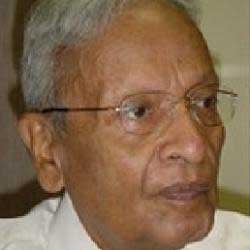
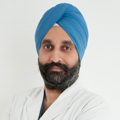
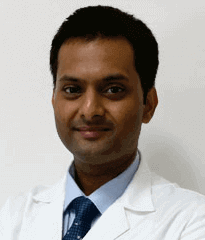
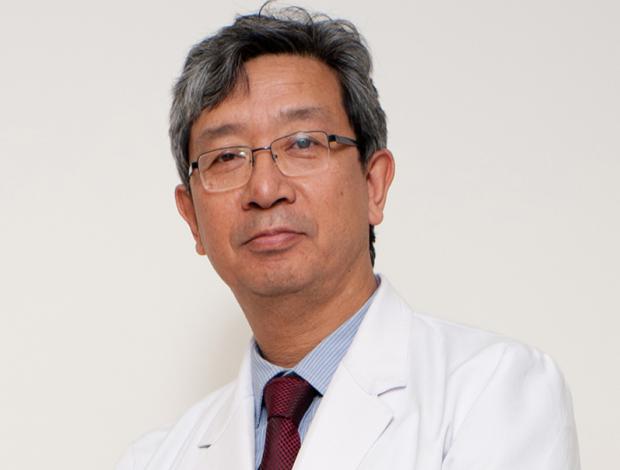



A craniotomy is the surgical removal of a part of the bone from the skull to expose the brain. This section of the bone is called the bone flap. The bone flap is temporarily removed and then replaced after the brain surgery has been done. Some procedures may use the guidance of computers and imaging to reach the precise location within the brain that is to be treated.
This technique requires the use of a frame placed onto the skull or a frameless structure that uses superficially placed markers on the scalp. Scans made of the brain with the help of these imaging techniques provide a three-dimensional image of a tumor within the brain. It is useful in making the distinction between tumor tissue and healthy tissue and reaching the precise location of the abnormal tissue.
What Makes You Eligible For Craniotomy?
A craniotomy may be done for multiple reasons such as:
Types of Craniotomy
Extended Bi-frontal Craniotomy: The extended bi-frontal craniotomy is a traditional skull base procedure generally used to target difficult tumors towards the front of the brain. Here, the surgeons generally recommend it as safer to remove extra bone than to unnecessarily manipulate the brain. The extended bi-frontal craniotomy involves making an incision in the scalp behind the hairline and removing the bone that forms the contour of the orbits and the forehead. This bone is replaced at the end of surgery. Removing this bone allows surgeons to operate in the space between and behind the eyes without having to unnecessarily manipulate the brain. The extended bi-frontal craniotomy is typically used for those tumors that cannot be removed by minimally invasive approaches.
Types of tumors that can be treated with the extended bi-frontal craniotomy usually include - Meningiomas, Esthesioneuroblastomas, and Malignant skull base tumors.
Minimally Invasive Supra-Orbital “Eyebrow” Craniotomy:
Supra-orbital craniotomy also often referred to as "eyebrow" craniotomy is a procedure used to remove brain tumors. In this procedure, neurosurgeons make a small incision within the eyebrow to access tumors in the front of the brain or as referred to as ‘pituitary tumors’. This approach is used when a tumor is very large or close to the optic nerves or vital arteries. Since it is a minimally invasive procedure, supra-orbital “eyebrow” craniotomy often provides less pain than open craniotomy accompanied with faster recovery and minimal scarring.
Retro-Sigmoid “Keyhole” Craniotomy
Retro-sigmoid craniotomy also often referred to as "keyhole" craniotomy is a minimally-invasive surgical procedure performed to remove brain tumors. This procedure allows for the removal of skull base tumors through a small incision behind the ear, providing access to the cerebellum and brainstem. Benefits of "keyhole" craniotomy include less pain after the procedure as compared to postoperative in open craniotomy, less scarring and a more rapid recovery.
Orbitozygomatic Craniotomy
The Orbitozygomatic craniotomy is a traditional skull base procedure used to target difficult tumors and aneurysms. This procedure is typically used for those lesions that cannot be removed by more minimally invasive procedures. Orbitozygomatic craniotomy involves making an incision in the scalp behind the hairline and removing the bone that forms the contour of the orbit and cheek. This enables surgeons to reach deeper and difficult parts of the brain while minimizing severe damage to the brain. Brain tumors that may be treated with Orbitozygomatic craniotomy include Craniopharyngioma, Pituitary tumors, and Meningiomas.
Translabyrinthine Craniotomy
A Translabyrinthine craniotomy is a procedure that involves making an incision in the scalp behind the ear, then removing the mastoid bone and some of the inner ear bone that contains receptors for balance. The surgeon then finds and removes the tumor or as much of the tumor as possible without the risk of severe damage to the brain.
What is Craniotomy?
A craniotomy is an opening of the skull enclosing the brain and its surrounding structures. Generally, in this procedure, the bone is preserved and later fixed into place at the end of the surgical procedure.
Why is it done?
This procedure is done if swelling occurs after the brain surgery or if the skull bone flap cannot be replaced for other reasons.
How long is the recovery?
It can take 4 to 8 weeks to recover from surgery. The cuts or incisions may be sore for about 5 days after surgery. There might be persistent numbness and pains near the wound, or swelling and bruising around the eyes.

Rating :
Dr. Franklin’s Panchakarma Institute is established in 1997. A pioneer in the arena of global spread of Ayurveda, physician Dr.V.Franklin visualized this institution to its existence. Within a short time of its founding, the clinic earned the title of ‘.....

Rating :



Continental Hospitals is a part of the Parkway Pantai Ltd. Parkway Pantai is one of the region's largest integrated private healthcare groups with a network of 22 hospitals and more than 4,000 beds throughout Asia, including Singapore, Malaysia, Brunei, India, .....

Rating :
Dr. Agarwal’s Group of Eye Hospitals is extending world class comprehensive eye care services since 59 years with a network of 67 eye hospitals, having global presence. Founded in 1957, our network of eye hospitals is spread across 8 states of India (includin.....

Rating :
Dr. Agarwal’s Group of Eye Hospitals is extending world class comprehensive eye care services since 59 years with a network of 67 eye hospitals, having global presence. Founded in 1957, our network of eye hospitals is spread across 8 states of India (includin.....

Rating :
Obino is your own personal weight loss coach on your mobile! When you download the Obino app, you can choose to lose weight on your own with our free e-coaching or choose to get paired with your own personal Dietician via our app - so that your coaching, diet and f.....

Rating :

The genesis of Sunshine Global Hospital, Manjalpur heralds transparent and trustworthy doctor-patient relationship... and its has also put an end to long awaited quest for the multispecialty and tertiary centre in southern part of Vadodara. Sunshine Global Hospital.....

Rating :
The healthcare wing of the AVN group, AVN Arogya Healthcare ltd, headquarted in Madurai, currenty operates a full fledged 100 bedded Ayurvedic Hospital at Madurai and a network of Ayurvedic treatment centres at Chennai, Madurai, Bangal.....

Rating :
We are one of the leading Quaternary Care Healthcare providers in India today with a network of nine (9) hospitals and over 2500 beds with hospitals located in Bangalore, Chennai, Hyderabad and Mumbai. Treating more than 5000 international patients annually from ov.....

Rating :

The Global Hospitals Group is one of India’s fast growing chains of tertiary care multi-super specialty and multi-organ transplant Hospitals. Offering exceptional healthcare services to patients in India and across the globe we hold a dominant presence in Sou.....

Rating :


Global Hospitals Group, India’s most renowned healthcare services provider offering better care, cutting-edge research and advanced education to caregivers, is one of the country’s fast growing chains of Multi Super Specialty Tertiary Care Hospitals offering healthcare services of .....






Not Available
Medtravels ensures bridging the gap and providing accessibility for patients to interact directly with healthcare service providers. We remain committed to connecting all stakeholders across geographies, and focusing on taking Healthcare beyond boundaries.

We are one of the first few organizations in India to be NABH certified. This itself speaks out loud about the services and facilities we provide to our clients while ensuring optimum quality at all aspects.

We ensure to bring you the best in terms of both healthcare quality & affordability. We value our customers so providing the best of services to them at an affordable price is our objective.

We understand that getting the first opinion is the most crucial step towards your healthcare journey and so based on your reports, we provide you consultation(s) or opinion(s) from top-notch doctors & consultants without any charges.

Travelling outside your home country can be a rigorous affair. So, here we are, to guide you through all the necessities such as – Medical Visa, Air Bookings, Accommodation, Air Ambulance, Pharmacy, Medical Loan, Leisure Travel.

We constantly strive to provide our clients with maximum options and so we have global coverage in terms of Healthcare Providers. We provide you hospital options from – INDIA, SINGAPORE, THAILAND, MALAYSIA, TURKEY & the list goes on

Our objective is to work with complete transparency with both our partners & clients. With this motto, we maintain not to charge you for anything. When you come for treatment, you pay the hospital directly.
Not Available